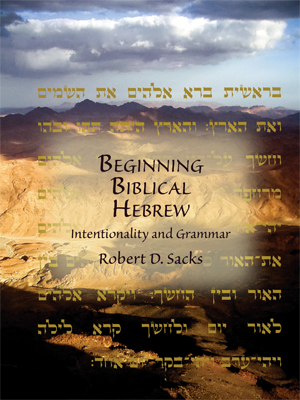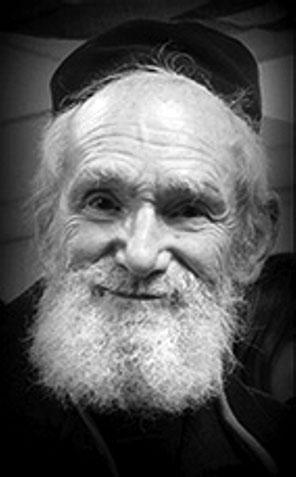Beginning Biblical Hebrew:
Intentionality and Grammar
by Robert D. Sacks
7" x 10", 206 pages, bibliography, texts for study, vocabulary list, verb paradigms, index.
Original publication date, 2008.
For pricing and ordering information, see the ordering section below.

"The most delightfully eccentric and daringly philosophic Hebrew grammar since Spinoza’s Compendium of the Hebrew Language."
--Warren Zev Harvey
Features
- An introduction to Biblical Hebrew grammar, from a developmental perspective.
- Combines instruction in basic grammar with a study of Biblical text
- Complete text and detailed comments on I Samuel ch. 20, with a vocabulary list keyed to the comments.
Appreciations of Beginning Biblical Hebrew
With his characteristic perspicacity, subtlety, and wondering philosophic intelligence, Robert Sacks has produced a truly remarkable exploration of Hebrew grammar, not only illuminating for students of the Hebrew language but wonderfully suggestive for students of language and logos as such. An outstanding achievement.
Leon R. Kass
Author of The Beginning of Wisdom: Reading Genesis
Professor in the Committee on Social Thought and the College, The University of ChicagoThe most delightfully eccentric and daringly philosophic Hebrew grammar since Spinoza’s Compendium of the Hebrew Language. Like Spinoza, Sacks is not content to describe biblical Hebrew, but seeks to recover its pre-biblical beginnings.
Warren Zev Harvey, chair
Department of Jewish Thought
The Hebrew University of JerusalemRobert Sacks introduces us to the “beginning” of Hebrew in several ways at once. He traces biblical Hebrew’s verb-centered vocabulary and grammar to their origins and parallels in other Semitic languages, by asking, “What pre-spoken need would have prompted ancient speakers-in-the-making to come up with this or that expression or, subsequently, to add some specific refinement to an already current expression?” In this way, he lets us consider how the structure of the language emerged from the intention of its originators.
Meanwhile he invites us to rethink their nascent thoughts—by starting with the felt need for writing itself, and proceeding from there to what induced would-be writers to formulate letters, vocalic modes, syllables, persons, verbs and numbers—until we are ready to read a biblical chapter on our own (I Samuel 20), with Sacks’s occasional word-by-word or phrase-by-phrase linguistic commentary for helpful (but non-intrusive) guidance. Sacks thus supplies a handy primer for today’s beginner, and simultaneous probings into the roots of the language for old hands.
Martin D. Yaffe
Professor of Philosophy and Religious Studies
University of North Texas[A] beautifully lyrical and poetic exposition of the relationship between grammatical form and intentionality. For me it was an eye opener. One takes so much for granted that it was a pleasure to be brought up short by the force of new ideas. Robert has the ability to stimulate me to reflect and make these observations. In his poetic quest for deeper and more profound meanings, for example in his deep analysis of Samuel 20, his analytical voice always sings. In his own words "[W]e may hope to see the modes of thought that we received unthinkingly as having arisen out of unreflective, yet nonetheless human, thought in the face of the things that are at hand. Only then can we call such modes of thought our own."
Isaac Benjamin
Independent Scholar
Sample pages
Below are links to PDF versions of sample pages from Beginning Biblical Hebrew.
You may need to open these PDF documents in Adobe Reader or an equivalent program.
About the Author
Robert D. Sacks was born 1931 in Akron, Ohio, where he would spend Saturdays with his grandfather in an old synagogue that stood on grounds now occupied by the United Disability Service. He continued his education at St. John's College, Annapolis, Maryland, (B.A. 1954), and at The Johns Hopkins University (Ph.D. 1961).
In the intervening years he studied with Leo Strauss, first at the Hebrew University, Jerusalem and later at the University of Chicago. In 1957 he enrolled at the Ecole des Langues Orientales Viventes in Paris but admits having spent most of his days at the Cafe de la Rue Tournould. Sacks has taught at St. John's College since 1960, at both the Annapolis and the Santa Fe campuses.
Robert Sacks is the author of two other books: The Lion and the Ass: Reading Genesis After Babylon (Kafir Yaroq Books, 2019) and The Book of Job: A New Translation with In-Depth Commentary (Kafir Yaroq Books, 2016.
